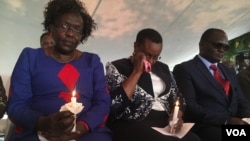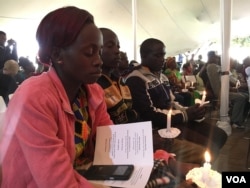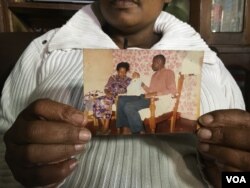August 7 is Kenya’s 9/11, the day of the worst terrorist attack in the country's history. On this day 20 years ago, a truck bomb destroyed the U.S. embassy in Nairobi, killing 213 people, most of them Kenyans. In Nairobi, hundreds gathered Tuesday to remember victims of the brutal attack.
Pamela Olum was in the hospital the day of the embassy bombing. Three days earlier, she gave birth to her third child.
She says her husband came to see her at Mater hospital and to pay the bill. He gave her 5,000 shillings for her 17,000 shilling bill and left for the bank to get the rest of the money. Olum says she never saw him again.
Lawrence Olum was one of the people killed on August 7, 1998, when al-Qaida exploded truck bombs in front of the U.S. embassies in this capital city and in Dar es Salaam, Tanzania. The attacks killed a total of 224 people and injured nearly 5,000.
On Tuesday, about 200 people, including survivors, gathered at a memorial park in Nairobi to honor victims of the attack and offer prayers.
Participants lit candles and laid flowers as signs of remembrance.
Teddy Gianopulos came to honor her sister, who worked at the U.S. embassy at the time of the bombings. She was 51 when she was killed.
“There is not a day we forget her. She is very much alive in our minds," Gianopulos said. "But this day is a painful day for all of us [in] her family: her children, her grandchildren, which she did not get to see."
Kenya National Counterterrorism Center Director Martin Kimani says his country still faces the threat of terrorism.
“Kenya was injured extraordinarily 20 years ago, and today, 20 years later, Kenya remains threatened by terrorism and terrorists. But our country has taken giant strides to prepare better, to be more ready,” said Kimani.
U.S. ambassador Robert Godec said that in the midst of evil carried out by terrorists on embassy staff and others, he saw humanity.
“The moment of the terrible terror, that atrocity of the attack, we also saw great heroism. We saw so many embassy staff, Kenyans, people coming together to help rescue those who were injured, to help retrieve those who had been killed, to help begin the process of rebuilding and working together,” said Godec.
For Pamela Olum, life has been difficult. But she has survived the years to overcome the pain and educate her children.
Her first-born is now a DJ (a music mixer). Her second child is a university graduate, and her third was accepted into a top Kenyan university this year.












